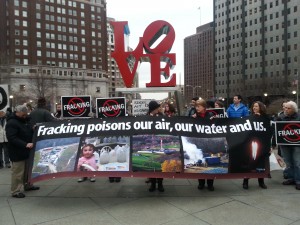Fractures in the Anti-Fracking Movement
-
Susan Phillips

Tom MacDonald / WHYY/Newsworks
Anti-fracking activists protest gas drilling at Philadelphia’s Love Park. Some activist groups are critical of the Environmental Defense Fund for working with industry.
Discord over how to best protect the environment from impacts of natural gas drilling has led to a coalition of grassroots environmental groups shunning the Environmental Defense Fund. The groups plan to hold a conference call on Wednesday to “send a message…disapproving of [EDF’s] willingness to be coopted by industry interests on the issue of hydraulic fracturing for shale gas.”
EDF recently drew the ire of fractivists when it announced its participation in The Center for Sustainable Shale Gas Development, a collaboration with energy companies and philanthropical organizations to develop performance standards related to protecting air and water quality. EDF is the only national environmental group to join the coalition, which also includes PennFuture, Group Against Smog and Pollution, and the Pennsylvania Environmental Council. [CSSD includes two organizations that also provide funds to StateImpact Pennsylvania: the Heinz Foundation and the William Penn Foundation.]
Critics say the Center is just a way for the industry to gain good publicity, and simply exploits its connection with EDF to suggest that a large consensus of environmentalists are on board.
The Environmental Defense Fund does seem like the only green friend working at the national level that the industry has left. At a panel discussion during an industry conference in Philadelphia last September, an EDF employee pleaded with industry representatives in the audience to do all they can to prevent environmental damage or leave the organization hanging out on a limb.
On its website, EDF describes itself as “passionate, pragmatic environmental advocates who believe in prosperity and stewardship.” It believes in working directly with industry, and using market forces to enact change.
EDF senior vice president Eric Pooley says his organization understands and supports the rights of others to oppose fracking. But he says as long as fracking is currently taking place, EDF’s approach is to fight for greater regulation.
“We think that a voluntary organization in support of strong standards can build a coalition that’s not just energy companies,” said Pooley, “but investors and communities as well. We’re trying to create leverage here and opposition is a part of that. There’s room for all these approaches to work, they go hand in hand.”
Pooley says EDF works with grassroots groups at the state level, and does not claim to be the voice of the anti-fracking movement. He points to the organizations’ support of municipalities challenging Act 13 on the basis of local pre-emption. And the group employs scientists who are working on issues regarding methane leaks from well sites, as well casing standards that would prevent damage to water supplies.
“We’re not trying to foist hydraulic fracturing on anyone,” he said. “We’re not saying everything is fine. Where we differ with some of our friends [in the environmental movement] is that CSSD is a helpful step. We don’t think the genie is going back in the bottle.”
















